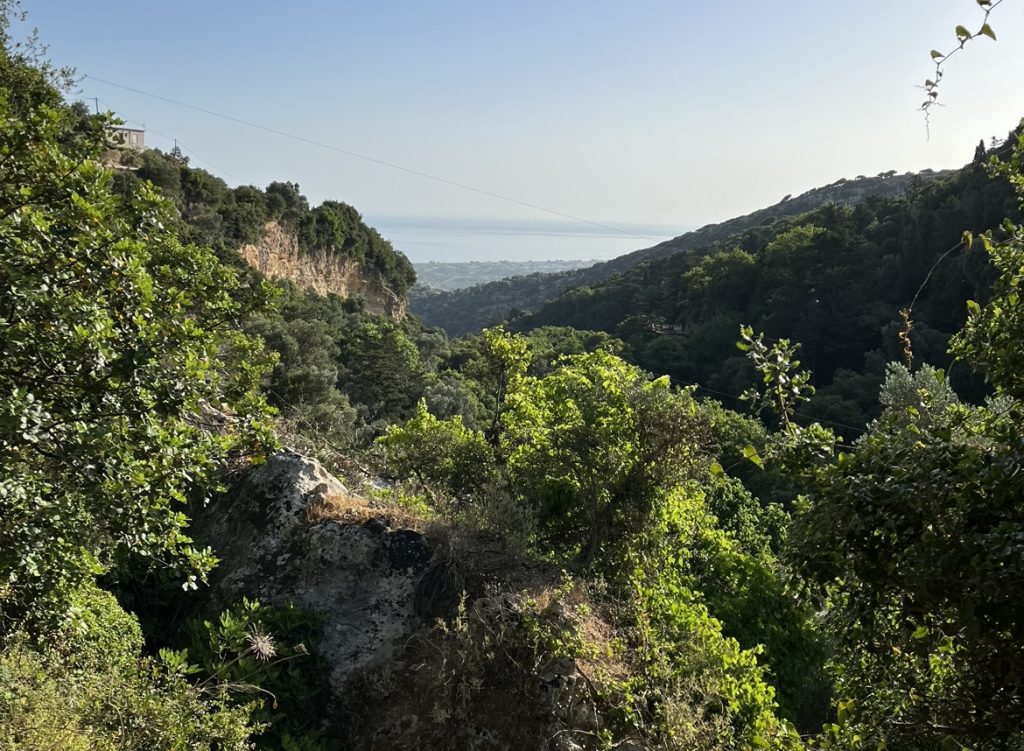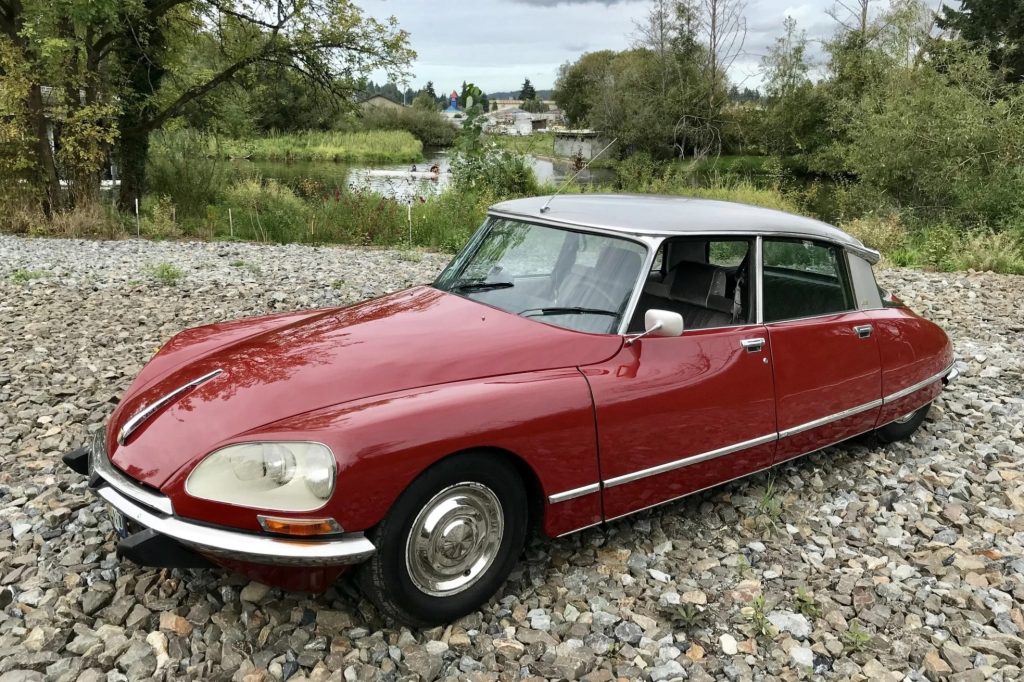
The Good Old Days
I was up at the crack of dawn yesterday morning intent on walking to the foot of the Myli Gorge (pictured from the top above). Instead of walking down it, as I’d done when last here a couple of years ago, I was going to walk to where it ends and then up it to where it starts. With the temperature being only 28° compared to 33° two years ago, I’d thought that a 5° drop would compensate for going up instead of down.
What I hadn’t factored in, though, was that I’d got a taxi to the starting point two years ago and, by the time I’d made it to the bottom of the gorge this time, already a couple of miles, and with yet more up to come, I was fried. Once again, thoughts of Michael Moseley played on my mind, and I turned back.
By the time I got back down to Rethymno it was 9.30 and the places along the shore that cater for the thousands of sunbed users who’d soon begin to stir were opening, and I slipped into the first that had people in already.
It’s a part of town I tend to skirt usually but at that time of day it was pleasant, the beach empty and quiet, the only sound being the waves lapping on the shore. I sat on an outdoor terrace along with a gaggle of older Germans who seemed to know each other and were all the same shade of red. I assumed that they must have all come together, perhaps family, and I rehydrated with water and orange juice.
As I sat there, viewing row after row of vacant sunbeds stretching as far as the eye could see, I’d wondered if at peak occupancy they and their heated users might sometimes be visible from space.
The Germans were a chatty group, and I’d picked up on one or two of their conversations, their language being one of the few subjects at school in which I’d excelled, motivated as I was by having a German penfriend. I’d stayed with his family in Hamburg, and he with mine in Sutton Coldfield.
My penfriend, Thomas, lived in a suburb south of Hamburg called Garsdedt and my time with his family had been a pivotal experience in my teenage years. It was very different to Sutton Coldfield, as my family was to his.
They lived in a rather sleek, architect-designed home with lots of white walls and glass, and his mum and dad, Lieselotte and Wolfgang, drove a red Citroen DS, an iconic car way ahead of its time, designed by an Italian sculptor and a French aeronautical engineer. At the time my dad had a Ford Anglia in Royal blue.

Lieselotte could have been a model, at least to my teenage eyes, and wore her hair short like a boy’s, and elegant white clothes that looked like they’d come from somewhere other than C&A, where my mum got hers and most of ours. Wolfgang looked similarly stylish and had a study, its walls lined with books, where he spent most of his time. Thomas and his younger brother, Martin, looked like they’d stepped out of a United Colours of Benneton catalogue. All spoke perfect English.
We all piled into the Citroen one day and spent the weekend in a house they owned on one of the Friesian Islands, Amrum. There they rode horses and Lieselotte painted, and on the second day they took me to a nearby beach.
It was one where the tide went far out and, as we walked towards the sea, Lieselotte had put her arm around my shoulder and, sending an exhilarating quiver through my teenage body, explained what FKK meant, about which I’d asked on seeing a sign.
It stood for Freikörperkultur, Free Body Culture, and most people on the beach wouldn’t be wearing clothes, but I could if I’d prefer to leave mine on. We didn’t have anything like that in Sutton Coldfield but, in amongst the nudists and with our beach towels spread, I became one too, red face and snow-white torso bared to the world.
In the turmoil of the hormonal shifts, growth spurts, acne and puberty of my teenage years, seeing Lieselotte in the nod, as we called it back home, and surrounded by countless other women with golden tans, such as only seen before in the grubby magazines passed around at school, it was an awkward day for me, punctuated by frequent dashes into the icy North Sea to cool off. Thomas and his brother, presumably used to this kind of thing, seemed unphased and read books, while all I could think about was not thinking about it, but also of telling my mates about it in the playground back home. They’d never believe it.
By now the Germans had livened up and were on their first beers. I couldn’t understand all that they said but I picked up on talk of the forthcoming October beer festival, to which it seemed they’d all be going.
Then suddenly I heard them speak of the Englische Unruhen, the English riots, and my ears pricked up. One of them, a great bear of a man with so much body fat that he looked like he had inflated balloons stuffed inside his clothes, opined that if you say anything about migrants in England, even on social media, they send you to prison. They all nodded in agreement and there were subsequent grumbles about censorship and borders.
Immigration again, a situation with which a war torn and ever warming planet now must grapple, but also one on which populism feasts. The riots were a symptom of the unease that mass migration creates but also of the misinformation and distortion the populists deploy, and then to the ridiculous nonsense espoused by the balloon man.
It had irked me in the beautiful morning sunshine and I rehearsed a retort, my rusty German aided by Google Translate. I wanted to correct them and tell them that the people who ended up in prison had made death threats. They were ‘patriots’ whose love of country was demonstrated by them smashing it up and setting fire to a migrant hotel. In England I’d say, it’s illegal to set fire to people, whoever they are.
But in the end, I didn’t. By the time I’d rehearsed my retort several times in my head the conversation had turned to the good old days, the same ones that the Brexiteers had promised back home, as populists do everywhere, making their countries great again. Like the gorge, it was too steep a hill to climb and I sidled off to my end of town thinking about the good old days.
In the good old days, when we were free of today’s killjoy tendencies of inclusivity and cultural sensitivity, life was one big ‘Carry On’ film. Back then there was free licence to use language largely, though not completely, frowned upon today, with women often defined by their physical characteristics, mainly their breasts and backsides, now spoken of privately or not at all. Locker room talk, to quote the orange Mussolini. Just a bit of fun
In the good old days overt racism was just a bit of fun too, the fact of it being at the expense of the butt of the joker’s mirth never considered, and any distaste expressed only going to show that they had no sense of humour anyway. And it was on the telly so it couldn’t be that bad.
It truly was. In the good old days of the 60s and 70s sit coms such as Love Thy Neighbour and Till Death Us Do Part were top of the ratings, purporting to draw attention to racial prejudice but relying on lazy stereotypes and racist tropes. Mind Your Language was another, set in a class for foreign students, each one portrayed by nationality-based stereotypes, with exaggerated accents and cultural characteristics the primary sauce (sic) of the laughs we all had.
I can’t remember who but, as someone once wrote, albeit flippantly because there are things far worse, when we think of the good old days, we should think of one word: dentistry.
Back at my end of the beach I went for a cooling swim thinking of when I was fourteen and first went for a swim in the nod. They were my good old days alright. “Ooh er mrs”, as the grinning men in the Carry On films used to say. As I swam, I remembered the day I told all my mates back home about Lieselotte, probably saying that she had a nice pair of tits, which made me laugh, ingest sea water and almost throw up.